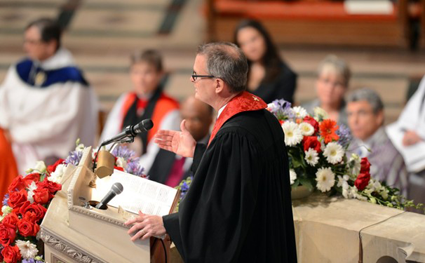
On homosexuality, many Christians get the Bible wrong
On homosexuality, many Christians get the Bible wrong
By

Homosexuality is one of the most divisive issues within churches and across our country today. The issue has become, for some, a litmus test on fidelity to God and the scriptures. The divide is not just between the progressives and conservatives. It is also a generational divide, with younger Christians generally seeing this issue differently than older Christians.
I recently delivered the sermon for the National Prayer Service at the presidential inauguration. While in Washington I took my family to the Lincoln Memorial. This iconic structure stands as a reminder of America’s great dream of equality and President Lincoln’s role in the emancipation of America’s slaves and the abolition of slavery in America. The words to Lincoln’s Second Inaugural Address are inscribed on the north wall of the memorial’s interior. In them Lincoln noted that at the center of the conflict over slavery were very different interpretations of the Bible. Lincoln said of the two sides in the war, “Both read the same Bible and pray to the same God, and each invokes His aid against the other.”
Southern preachers and slave owners believed the many references in the Bible permitting and regulating slavery (well over 100 verses), in both the Old and the New Testaments, were clear evidence that the institution was a part of God’s social and moral order. Abolitionist preachers argued in their sermons that the verses related to slavery in the Bible were a reflection of the cultural context and times in which the Bible was written and did not reflect God’s endorsement of slavery. They argued that there were “weightier” scriptures on justice, mercy and love that superseded those on slavery. This was the position that Lincoln himself adopted.
At the center of the divide over homosexuality today is the Bible. Conservatives and progressives “read from the same Bible and pray to the same God, and each invokes His aid against the other.”
There are a handful of Scriptures (five or eight depending upon how one counts) that specifically speak of same-sex intimacy as unacceptable to God. Conservatives or traditionalists see these as reflecting God’s timeless will for human relationships. Progressives look at these same scriptures in much the same way that progressives in the nineteenth century looked at the Bible’s teaching on slavery. They believe that these verses capture the cultural understandings and practices of sexuality in biblical times, but do not reflect God’s will for gay and lesbian people.
In my own life, it was both reading the Bible’s passages on same-sex intimacy in the same light as passages on slavery (and violence and the place of women) and coming to know gay and lesbian people that led me to see this issue differently, particularly children who grew up in my church who loved God and sought to serve Christ. As I listened to their stories I saw that they did not fit the stereotypes I had been taught about gay and lesbian people. The love they shared with others looked very much like the love I share with my wife --a deep friendship and companionship. And their faith was as authentic as that of anyone else in my congregation.
For many Christians today, particularly young adults, the handful of Bible verses related to same sex intimacy seem more like the 100 plus verses on slavery than they do the teachings of Jesus and his great commandments to love God and neighbor. Their gay and lesbian friends are people, just like them, in need of love and community. I believe that in the years ahead an increasing number of Christians, not only progressives, but also conservatives, will read the Bible’s passages regarding homosexuality as all Christians today read the Bible’s passages on slavery. And the sermons preached from America’s pulpits decrying the rights of homosexuals today will sound to future generations much like the pro-slavery sermons sound to us today.
Adam Hamilton is a United Methodist pastor and author of “When Christians Get it Wrong” (Abingdon, 2013)
This article originally appeared on the Washington Post website February 2013.

Login/Register to leave comment